
Think Again: Are Education Programs for High Achievers Inherently Inequitable?
This brief challenges the notion that marginalized students of high ability are harmed by advanced education, with implications for better screening measures and expansion of programs.

Fwd: It's All About the Kids
In just more than five years, Mary Anne Stanton has led 13 Catholic schools from high-poverty Washington, D.C. neighborhoods into a consortium that has not only strengthened each school's financial health, but has also greatly improved the academic performance of the children the schools are charged with educating. To get there, she's installed a new standards-based curriculum, shaken up old bureaucratic approaches, and streamlined operations. In its latest Fwd: Arresting Insights in Education, the Thomas B. Fordham Foundation presents a compelling story of just how much change can be made by one determined school leader with a vision.
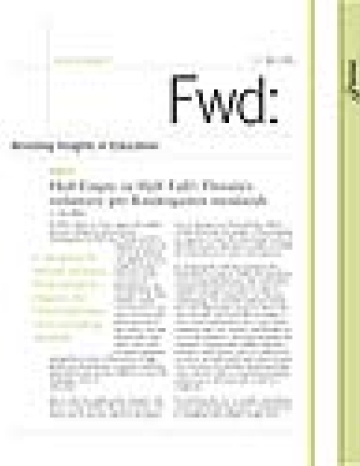
Fwd: Half Empty or Half Full?: Florida's voluntary pre-Kindergarten standards
In 2002, when its voters approved a ballot measure calling for universal pre-Kindergarten by 2005-06, Florida joined a handful of states in which all children are eligible for free, publicly funded education in the year prior to Kindergarten. The passage of the referendum was cause for great optimism among those aware of the power of high-quality pre-K programs to prepare children, particularly low-income children, to meet the challenges of K-12 education. But as with any public policy initiative, the devil is in the details. In designing the half-day Voluntary Pre-Kindergarten program (VPK), the Florida legislature faced competing demands. How did they balance the trade-offs? Amy Wilkins of the Education Trust lays it out in Fordham's latest Fwd: Arresting Insights in Education.
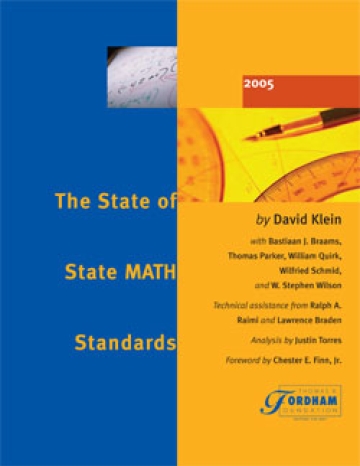
The State of State Math Standards 2005
States still have far to go in setting rigorous, high quality expectations for K-12 math instruction. Although a majority have replaced or revised their math standards since 2000, many have failed to make substantial improvements. The review was led by David Klein, Professor of Mathematics at California State University-Northridge, and evaluates the content, writing quality, and clarity of K-12 math standards in each state. Klein and his team attribute many of the shortcomings to overuse and wrong applications of manipulatives and calculators; wrong-headed guidance from the National Council of Teachers of Mathematics; and lack of true mathematics competence among those writing the standards.
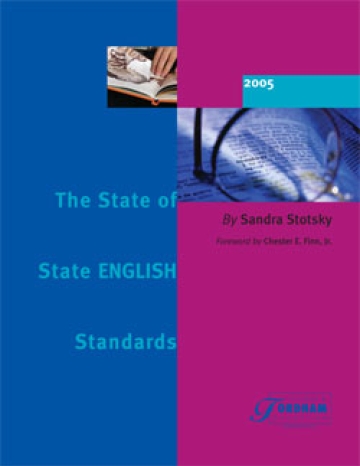
The State of State English Standards 2005
Do states' current English/language arts and reading standards expect what they should? Are they demanding enough? Clear enough? Are states using them to guide not only the curriculum and assessment system for students but also their teacher-training programs? Sandra Stotsky, research scholar at Northeastern University and former senior associate commissioner in the Massachusetts Department of Education, finds that most states have revised or replaced their standards since 2000 and made some improvements, especially to K-8 standards. However, major shortcomings remain in other areas including high school literature requirements.
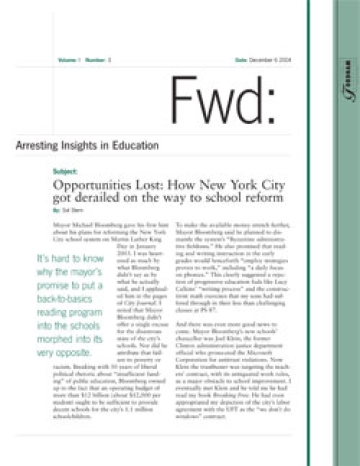
Fwd: Opportunities Lost: How New York City got derailed on the way to school reform
How did New York City's experiment in school reform, once so promising, become such a mess? Author Sol Stern explains in this third edition of Fordham's new Fwd: series of short articles of interest to K-12 education reformers.

The Mad, Mad World of Textbook Adoption
Statewide textbook adoption, the process by which 21 states dictate the textbooks that schools and districts can use, is fundamentally flawed. It distorts the market, entices extremist groups to hijack the curriculum, enriches the textbook cartel, and papers the land with mediocre instructional materials that cannot fulfill their important education mission. Tinkering with it won't set it right, concludes this latest Fordham Institute report. Legislators and governors in adoption states should eliminate the process, letting individual schools, individual districts, or even individual teachers choose their own textbooks.
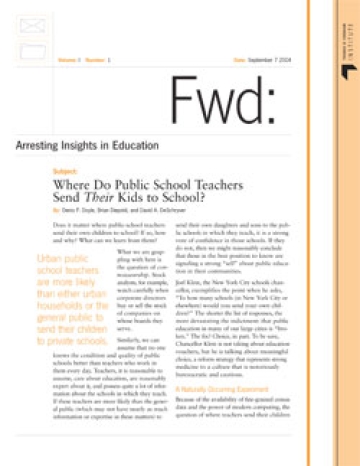
Fwd: Where Do Public School Teachers Send Their Kids to School?
Does it matter where public-school teachers send their own children to school? If so, how and why? What can we learn from them?
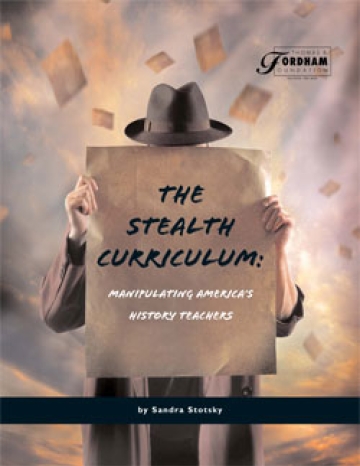
The Stealth Curriculum: Manipulating America's History Teachers
Widely used supplemental materials may be dangerous to educational health! These works often include hefty doses of political manipulation and ideological bias, courtesy of their authors. This study casts a wary glance toward materials that seldom come under scrutiny. This study is the fifth in a series dedicated to reforming social studies education.
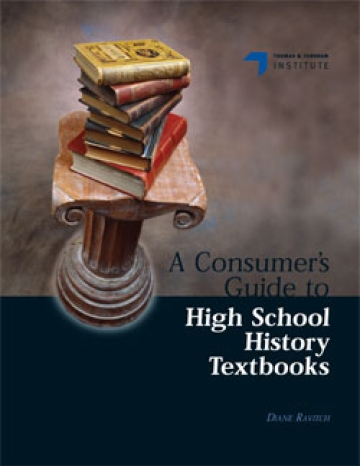
A Consumer's Guide to High School History Textbooks
A Consumer's Guide to High School History Textbooks is a summary review of 12 widely used U.S. and world history textbooks.
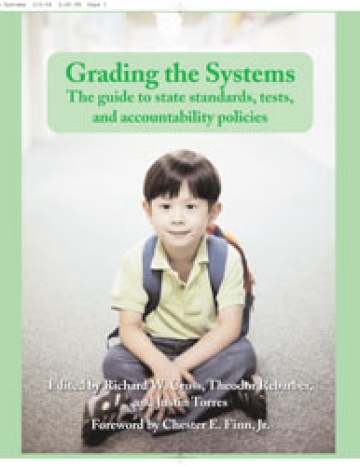
Grading the Systems: The guide to state standards, tests, and accountability policies
Co-published by the Thomas B. Fordham Foundation and AccountabilityWorks, with support from the Smith Richardson Foundation, this report looks at six elements of K-12 accountability systems in 30 different states. Each state is rated on standards, test content, alignment of tests to standards, test rigor, testing trustworthiness and openness, and accountability policies. The major conclusion: while some states have the basis of a sophisticated and rigorous accountability system in place, no state has every element of a serious standards-based education reform package in place. And few states are as open to evaluation as they ought to be.
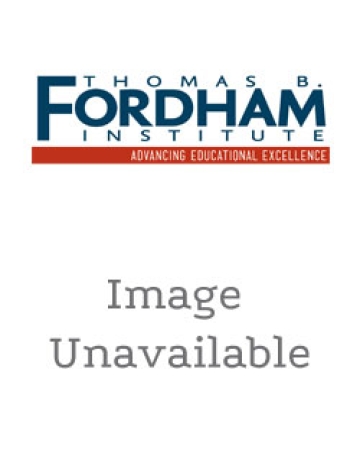
2004 Thomas B. Fordham Prizes for Excellence in Education
This brochure contains profiles of the winners of the second annual Thomas B. Fordham Foundation Prizes for Excellence in Education. The 2004 prize for Valor is awarded to Howard Fuller, and the 2004 prize for Distinguished Scholarship is awarded to Eric Hanushek.
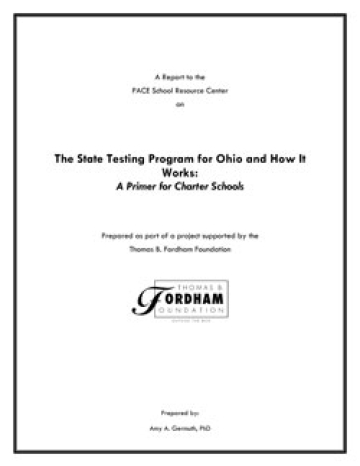
The State Testing Program for Ohio and How It Works: A Primer for Charter Schools
With the passage of the politics-governance Act (NCLB), states have had to adjust their accountability systems to comply with federal law. As a result, in the summer of 2003 Ohio's Governor Taft signed House Bill 3, which dramatically changed the state's assessment system and what it means for charter schools. This report helps charter school leaders coordinate their testing and data reporting procedures to meet state and federal guidelines, in the hope that all students might surpass Ohio's academic expectations.